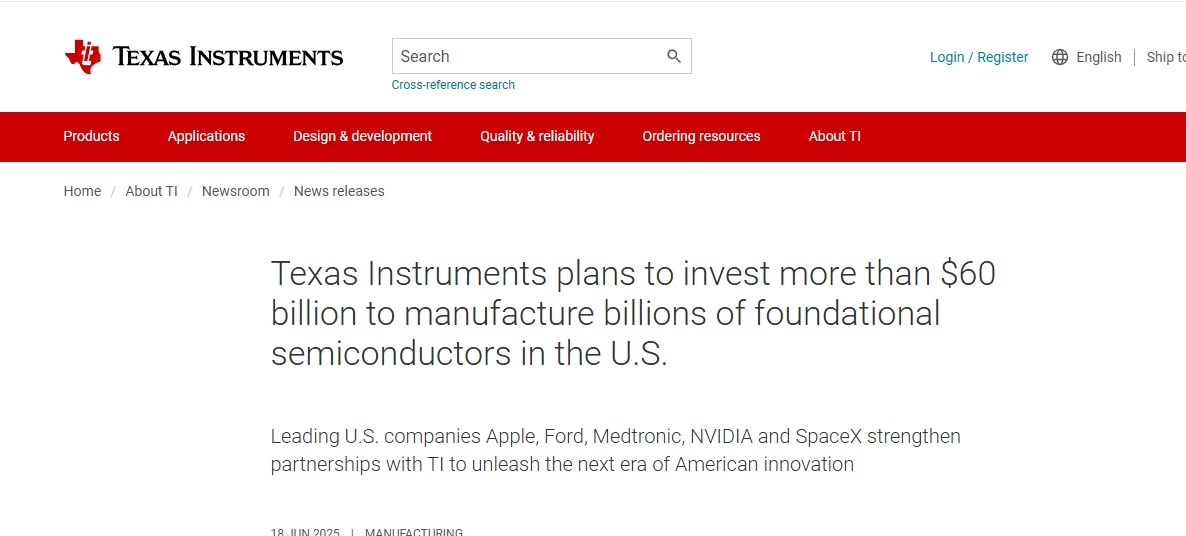Texas Instruments' massive expansion: $60 billion, 7 chip factories!
On June 19, Texas Instruments announced that it would invest more than $60 billion to build seven wafer fabs in Texas and Utah, setting a record for mature chip production investment in the United States, and is expected to bring more than 60,000 jobs. As a veteran semiconductor manufacturer, Texas Instruments focuses on analog and embedded processing chips.

Haviv Ilan, president and CEO of Texas Instruments, said: "Texas Instruments is building reliable, low-cost, large-scale 300mm wafer production capacity to provide analog and embedded processing chips that are critical to almost all electronic systems. Leading American companies such as Apple, Ford, Medtronic, Nvidia and SpaceX rely on Texas Instruments' world-class technology and manufacturing expertise. We are honored to work with them and the United States to unleash the potential of American innovation."
The company did not give a specific investment timetable. Texas is its home base, and Texas Instruments has invested as much as $46 billion in the state and about $15 billion in Utah. Texas Instruments said its long-term capital spending plans remain unchanged, with wafer fabs in Texas and Utah producing hundreds of millions of U.S.-made chips per day at seven facilities across three manufacturing sites in Sherman, Richardson, Texas, and Lehigh, Utah.
Sherman, Texas: SM1, Texas Instruments’ (TI) first new wafer fab in Sherman, will begin initial production this year, just three years after breaking ground. The exterior structure of Sherman’s second new wafer fab, SM2, has also been completed. The gradual investment plan includes two additional wafer fabs, SM3 and SM4, to support future demand.
Richardson, Texas: TI’s second wafer fab in Richardson, RFAB2, continues to increase production and builds on the company’s introduction of equipment at RFAB1, the world’s first 300mm analog wafer fab, in 2011.
Lehigh, Utah: Texas Instruments is accelerating construction of LFAB1, the company’s 300mm wafer fab in Lehigh. The construction of Lehigh's second wafer fab, LFAB2, is also progressing smoothly. The plant will be connected to LFAB1.
However, TI's high capital expenditure has caused dissatisfaction among some investors, who are worried that the huge cash investment will compress short-term returns. But the company emphasized that this wave of expenditure is a "short-term peak" and promised that after completing the upgrade of the Utah plant and the construction of the Sherman campus, it will gradually reduce capital expenditure and resume cash returns to shareholders, including dividends and treasury shares.
Haviv Ilan said in April that the company has completed about 70% of the capital investment stage and is entering the final stage. In the future, it will return to a stable capital allocation route.
At the beginning of the month, TI announced that it plans to raise prices for some product lines, which is seen by the outside world as an important measure to abandon price wars and maintain profit margins.
It launched a price war in 2023, and its gross profit margin began to decline, from 68.8% in 2022 to 56.8% in the first quarter of 2025. In the latest quarter, Texas Instruments' revenue was US$4.069 billion, up 11% year-on-year and 2% quarter-on-quarter. Its second-quarter revenue is expected to be between US$4.17 billion and US$4.53 billion, higher than the market forecast of US$4.1 billion.

